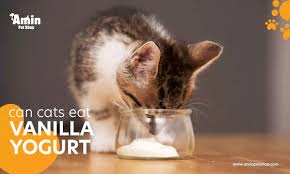Can Cats Have Yogurt? A Simple Guide for Pet Parents

Can cats have yogurt? This is a question many cat owners ask when they see their furry friend begging for a taste of this creamy snack. Cats are naturally curious about human food, and yogurt often grabs their attention because of its smell and texture. But as a loving pet parent, you may wonder if it is safe or if it could upset their stomach. The answer isn’t always simple, because while yogurt can have some benefits for cats, it can also cause problems if given the wrong way. Understanding the risks and safe options is important before letting your cat lick the spoon. In this blog, we will explore when yogurt may be okay for cats, what types are safer, and how to offer it in small, healthy amounts so your kitty stays happy and healthy.
Can cats have yogurt without any worries? The truth is, most cats are lactose intolerant, which means their bodies cannot handle milk and dairy products very well. Even though yogurt has less lactose than milk, it can still cause tummy troubles like gas, bloating, or diarrhea for many cats. However, plain and unsweetened yogurt, especially those with live probiotics, may sometimes help with digestion and provide a small health boost in rare cases. Still, yogurt should never replace real cat food and should only be seen as an occasional treat, not a daily snack. Cat parents should also avoid flavored or sweetened yogurts, because these often contain sugar, artificial flavors, or even dangerous ingredients like xylitol, which is toxic to cats. The safest way is to offer only a tiny lick of plain yogurt once in a while and watch closely for any reaction. If your cat shows any sign of discomfort, it’s best to skip yogurt completely and stick to safe treats made for cats.
What Does It Mean When We Ask: Can Cats Have Yogurt?
When people ask “can cats have yogurt,” they are really wondering if this human snack is safe for their furry friend. Cats are curious animals and often want to taste food that their humans eat. Yogurt is creamy, has a strong smell, and looks inviting to a cat. But not all foods people eat are safe for cats. Some snacks can upset their stomach or even make them sick. Yogurt is one of those foods that may be okay in very small amounts, but it is not something cats actually need to stay healthy. Cats are obligate carnivores, which means their bodies are built for meat, not dairy. So, when we ask this question, we want to know if yogurt can be given as a small treat without harm, and if it provides any real benefit at all.
Why Most Cats Find Yogurt So Tempting
Cats often act excited when they smell yogurt because it has a rich scent and creamy taste that grabs their attention. They may even run into the kitchen when a container is opened, hoping for a lick. Yogurt has fats and proteins, which are things cats naturally crave. It may remind them of milk, even though most cats cannot handle milk well. Some cats also enjoy the cool and smooth texture, which feels different from their usual dry or wet cat food. Pet owners may find this behavior funny or cute, but it can cause confusion. Just because cats beg for yogurt does not mean it is always good for them. Their curiosity makes them want to try it, but their bodies may not agree. This is why cat parents should learn the truth about yogurt before sharing it with their little friend.
Can Cats Have Yogurt Safely or Is It Risky?
Cats can have yogurt safely only in very small amounts and only if it is plain, unsweetened, and does not contain harmful ingredients. A tiny lick or spoonful once in a while may not cause any harm for some cats. But giving too much yogurt can upset their tummy and lead to problems like gas, diarrhea, or vomiting. Flavored yogurts are especially dangerous because they often contain sugar, artificial sweeteners, or even xylitol, which is very toxic to cats. Another risk is that yogurt can take the place of real cat food if offered too often, which is not healthy. While yogurt does have probiotics that can help digestion, cats usually do not need them this way. So, the safest choice is to only give yogurt as a rare treat and always watch how your cat reacts afterward.
The Truth About Lactose Intolerance in Cats
Most cats are lactose intolerant, which means their bodies cannot break down lactose, the sugar found in milk and dairy products. When cats are kittens, they drink their mother’s milk and have the enzyme lactase to digest it. But as they grow older, the enzyme decreases or goes away, making it hard for them to handle dairy. If an adult cat eats too much lactose, it may lead to stomach problems like bloating, cramps, or diarrhea. Yogurt has less lactose than milk, but it still contains enough to bother sensitive cats. This is why yogurt should never be seen as a normal food for them. While some cats may tolerate a little better than others, many will feel uncomfortable after eating it. Knowing this fact helps cat parents make safer choices and avoid giving their pets food that could cause pain.
Which Type of Yogurt Is Safest for Cats?
If you really want to let your cat try yogurt, the safest type is plain, unsweetened yogurt with no flavors, sugars, or artificial sweeteners. Greek yogurt is usually better than regular yogurt because it has less lactose, but it should still only be given in tiny amounts. Always check the label to make sure there are no harmful ingredients like xylitol, which is very toxic to cats. Flavored yogurts with fruit, chocolate, or vanilla are never safe. Some yogurts also come with added probiotics, but these are made for humans and not always right for cats. Even safe yogurt should only be offered as a rare treat, never daily food. If your cat seems uncomfortable after eating yogurt, it is best to avoid it completely. Sticking to cat treats made for pets is always the healthier and safer choice overall.
Conclusion
So, can cats have yogurt? The answer is yes, but only a tiny bit, and only plain and unsweetened yogurt. Most cats love the smell and taste, but their tummies do not always agree with it. A small lick is usually safe, but too much can make them sick. That is why yogurt should stay as a special treat, not everyday food.
As a cat parent, you should always watch your furry friend after they try something new. If your cat feels sick after yogurt, it is better to stop giving it. There are many safe and yummy treats made just for cats that will not upset their stomach. When in doubt, ask your vet before sharing human food. Your kitty will still love you, even without yogurt.
FAQs
Q: Can cats have yogurt every day?
A: No, cats should not have yogurt every day. It is only safe as a rare treat.
Q: What kind of yogurt can cats eat?
A: Plain, unsweetened yogurt without sugar, flavors, or xylitol is the safest.
Q: What happens if my cat eats too much yogurt?
A: Your cat may get an upset stomach, gas, or diarrhea if they eat too much.
Q: Is Greek yogurt better for cats than regular yogurt?
A: Yes, Greek yogurt has less lactose, so it may be a little easier for cats, but still only in tiny amounts.
Q: Can kittens have yogurt safely?
A: It is better not to give yogurt to kittens, as they should focus on proper kitten food for healthy growth.
